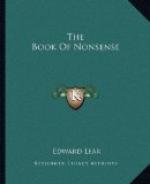The other nonsense-poems are all good, but we have no space for further quotation, and will take leave of our subject by propounding the following set of examination questions which a friend who is deeply versed in Mr. Lear’s books has drawn up for us:—
1. What do you gather from a study
of Mr. Lear’s works to
have been the prevalent
characteristics of the inhabitants of
Gretna, Prague, Thermopylae,
Wick, and Hong Kong?
2. State briefly what historical
events are connected with
Ischia, Chertsey, Whitehaven,
Boulak, and Jellibolee.
3. Comment, with illustrations, upon
Mr. Lear’s use of the
following words:
Runcible, propitious, dolomphious, borascible,
fizzgiggious, himmeltanious,
tumble-dum-down, spongetaneous.
4. Enumerate accurately all the animals
who lived on the
Quangle Wangle’s
Hat, and explain how the Quangle Wangle
was enabled at once
to enlighten his five travelling companions
as to the true nature
of the Co-operative Cauliflower.
5. What were the names of the five
daughters of the Old
Person of China, and
what was the purpose for which the
Old Man of the Dargle
purchased six barrels of Gargle?
6. Collect notices of King Xerxes
in Mr. Lear’s works, and
state your theory, if
you have any, as to the character and
appearance of Nupiter
Piffkin.
7. Draw pictures of the Plum-pudding
flea, and the Moppsikon
Floppsikon Bear, and
state by whom waterproof tubs
were first used.
8. “There was an old
man at a station
Who
made a promiscuous oration.”
What bearing may we
assume the foregoing couplet to have
upon Mr. Lear’s
political views?
—The
London Spectator.
* * * * *
A BOOK OF NONSENSE
by
EDWARD LEAR.
With All the Original Pictures and Verses
[Illustration]
There was an Old Derry down Derry, who loved to see
little folks
merry;
So he made them a Book, and
with laughter they shook
At the fun of
that Derry down Derry.
Original Dedication.
TO THE
GREAT-GRANDCHILDREN, GRAND-NEPHEWS, AND GRAND-NIECES
OF EDWARD, 13TH EARL OF DERBY,
THIS BOOK OF DRAWINGS AND VERSES
(The greater part of which were
originally
made and composed for their parents.)
Is Dedicated by the
Author,
EDWARD LEAR.
London, 1862.
* * * * *
[Illustration]
There was an Old Man with
a nose,
Who said, “If you choose
to suppose
That my nose is too long,
you are certainly wrong!”
That remarkable Man with a
nose.




